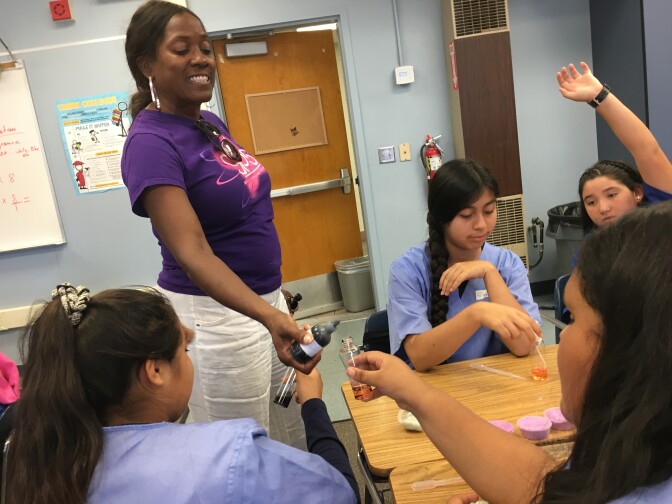In a middle school classroom in Lynwood, two dozen girls wear blue lab coats as they listen to an instructor leading their one-week summer science camp.
It’s the second-to-last day of the camp and sixth-grader Mayra Ramirez thinks about how different it’s been this week making friends compared to the school year. “No one likes me because I’m too weird, they said," Ramirez said. "I tried to make friends, and some friends came to me – but not a lot."
Now, things are different. She looks over at one of the girls in her group. "Gabby, she’s is really nice to me, and she tells me all the stuff we need to do, and I really wanted to be her friend and I’m happy she’s in my group."
School programs to motivate girls into science, technology, engineering, and math careers aren’t new. Girls Pursuing Science, the organization that runs this camp for Lynwood schools, does so in half a dozen other states. What’s new is that this school district targeted middle school girls either in foster care or classified as homeless.
Ramirez is one of the students they targeted. It's the first time the school district has held a summer camp for this group of students.
“Because they’re underserved, they’re invisible,” said Shirley Davis, who works in the school district office that provides support for homeless, foster and other students.
“They’re living in a situation in a home where there’s multiple people in the home, somebody’s living in the garage all the bedrooms in the house are taken up and they’re living in the living room,” Davis said. That kind of situation makes it difficult for the student to do homework.
Kids in foster care, she said, often move between homes and that disrupts their education as well as the relationships with students and adults that they rely on to have a stable life.
“The biggest piece to this is, kids have to feel like you care, kids have to feel welcome, kids have to feel they have an advocate or there’s somebody for them," Davis said. "That’s why you’ve probably seen me today put my arms around I don’t know how many kids."
At this science camp instructors do a lot more one-on-one talking and counseling with the students than they might in a typical science day camp, because they know that these students’ difficult home lives often affect their time in school.
On this day there’s one adult for every four students.
According to California Department of Education data, just half of students in foster care graduate from high school. That’s 33 percentage points lower than the graduation rate for all students. The state doesn’t post graduation rates for the state’s homeless students. One expert said that nationally, fewer than 20 percent of homeless students reach high school graduation.
California officials acted to change in 2013 that by forcing schools to track the learning of homeless and foster students and put their plans to improve their student achievement levels in a publicly available document called the Local Control and Accountability Plan.
The Lynwood Unified School District decided to use some of its state funding to pay for this camp and to create positions to follow these students during the school year. About 140 of the district's nearly 15,000 students were foster youth in 2015, state data shows. The school district says about 350 of its students are classified as homeless.
With support, school officials said that these students can achieve like other students. To that end this camp exposes students to real science.
“A perfume chemist is one of the highest paid chemists in the science business,” Jacqueline Thomas tells the girls from the front of the class as she holds a container of concentrated fragrance.
Thomas is the founder of Girls Pursuing Science. The Lynwood school district hired her to lead the camp.
Thomas and the other instructors said a girls-only classroom lets these teenagers work on problem solving. They and the girls said that it would be a very different setting if boys were in the class.
“The boys, they like being the leaders, but here girls [have to] be the leaders and they’re telling us the girls are powerful to do whatever they want,” said sixth grader Mary Jane Garcia.
There’s no homework in this science camp. The girls work in groups and make presentations in front of the class. And there’s a lot of positive affirmation.
“Perseverance means that no matter what happens, I’m going to keep moving toward my goal,” said Patricia Brent-Sanco, a Lynwood administrator helping to run the camp.
On this day, the penultimate day of the camp, it appears that the school district’s efforts to sell these girls on science, math, technology, and engineering careers is working.
“How many of you have changed your mind about science, how many of you think you might be a scientist?” Brent-Sanco asked. Nearly all hands shot up.
“Shucky ducky quack quack, look at that,” she said.









